Why Do We Love Vampires?
"Been to a bookstore or movie theater lately? A dangerous, sexy, yet oddly civilized attraction has gripped the nation. Twilight!
Why do teenage girls and grown-up women so love these tales of blood and lust?
"It's the erotics of anticipation," says Emily Hodgson Anderson, Ph.D., an assistant professor of English at the University of Southern California. As an expert on an earlier age of Gothic romance (those in the 18th century), she thinks the current appeal of these books and movies is in their mirror image of the age that gave us the first Gothic novels—The Castle of Otranto, The Monk and Pamela—an age of sexual repression and fear of women's sexuality."
Særlig vampyrenes fashion sense.

Fra Alice hos Twilighters Anonymous.
"Sexy Restrain
"The appeal now is precisely because we are not sexually repressed," says Anderson. "Sex is everywhere. We're pretty desensitized. So these stories re-introduce anticipation, the almost infinite deferral of any type of sexual consummation."
"The archetypal vampires are larger-than-life, charismatic entities of power and mystery who once were human and now display abilities beyond human limitations. They can defeat death, seduce anyone of their choosing, obliterate their enemies and stay up all night. What's not to like?"
— Forensic psychology professor Katherine Ramsland, Ph.D., author of Beating the Devil's Game: A History of Forensic Science and Criminal Investigation
In most Gothic novels, women are expected to have no sexual desires at all—yet paradoxically, the fear was that if unleashed, their desires would run rampant. In The Monk by Mathew Lewis, published in 1796, there was no vampire, but there was a young woman who snuck into the monastery in the guise of a boy. She was the Devil. She not only seduced the high-ranking monk, but goaded him into murder and other really bad things until he went to Hell. "It's called sensation literature," says Anderson. "The paranoia was that women were sexually insatiable, and if these passions were not strictly controlled, they would be rampant. The idea is that this is an aspect of female nature that is present but should not be encouraged.""

Fra Robsessed.
"Edward, the leading vampire in Twilight, advocates this idea. And there is a kind of mirror image of contradiction in today's craze, says Anderson. "When you read fan boards on Twilight, people say it's so great to see a model of chastity," she explains. "But others say that Bella [Edward's love interest] is a complete nymphomaniac. Her boyfriend sneaks into her room every night. No wonder preteenagers and teenagers like it. I've even read [threads from] guys who tell other guys, 'You should read this book and use Edward as an instruction manual.'"
It reminds Anderson of another 18th century blockbuster, Pamela, or Virtue Rewarded, by Samuel Richardson. Published in 1740, the book is about a servant girl whose master tries to seduce her. She doesn't succumb and he rewards her with marriage. "Some people thought it was a wonderful exemplar of female virtue, but it's titillating; there's attempted rape after attempted rape," Anderson says. "The fact that the woman is not seduced until after marriage doesn't do away with the sexual tension that exists throughout the marriage.""

Fra Robsessed.
"Edward vs. Harry Potter vs. Peter Pan
So for you moms and dads of preteenage girls out there, beware. Something is stalking your daughter on the page and in the darkness of the movie night. It doesn't surprise Anderson that the story appeals to women of all ages, either. "The vampire represents the intensification of the bad boy appeal, yet frames it in a gentlemanly way," she says. "It's risk coupled with civility."
Hello there, Mr. Perfect Edward Cullen.

Fra elvan's livejounal via Robsessed.
""Indeed, Edward is an ethical vampire. Bella's parents would say that this is ridiculous, but her trust in him is not displaced. She's right. It's a risk that pays off," Anderson continues. "It taps into the teenage fantasy of being vindicated. She's a supremely average girl who's overlooked, yet Edward notices her. He sees her as something special and unique. That is a basic human desire."
In the end, says Anderson, the appeal of these books (and now the movie) isn't really Harry Potter as much as it is Peter Pan. "Once you become a vampire, you are immortalized at the age at which you become one," she says. "It's a Peter Pan–like fantasy. You're fixed in this moment right between childhood and adulthood. You always can enjoy the drama and intensity of the adolescent experience. You never have to grow up. Plus, you get to stay up all night.""
Funnet via Open Book Society.


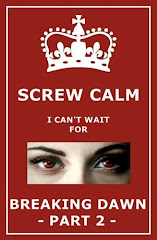
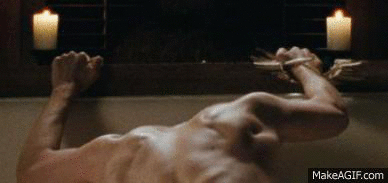


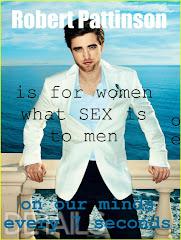
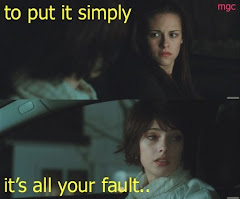


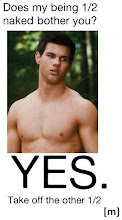
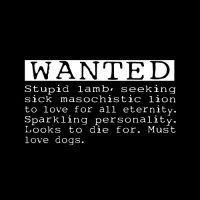
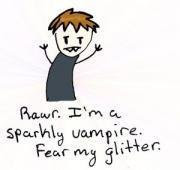




Ingen kommentarer:
Legg inn en kommentar